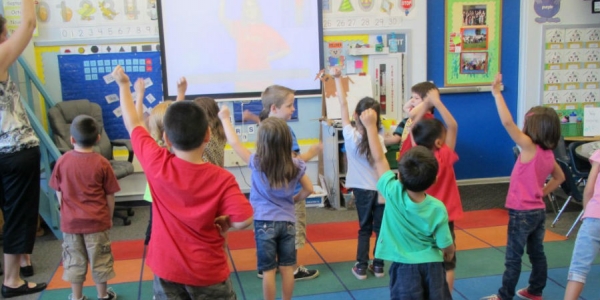The school started using music as a tool to educate its pupils about the environment after hearing about a project called Project Earth Rock, which creates songs, animation and videos about sustainability for schools. The resource works well for the students, says Cleine, because it offers both a clear message and a visual aid.
Capturing the imagination
Gomersal St Mary’s CE primary school in Cleckheaton, near Bradford, has also found the creative arts helpful with engaging pupils in discussions about sustainability. Here, children aged eight and nine have been learning about people in Pakistan who make fair trade footballs. “The children make footballs out of recycled paper, carrier bags and elastic bands, and they discuss global issues around poverty, fairness and fair trade,” explains Cindy Sheard, a teacher at the school.
The children have also made “bottle bug hotels”, which involves filling leftover plastic bottles with twigs and leaves for insects to live in. Teacher Emma Wilson says: “The kids learn that if you remove the bottom of the food chain web, there’d be nothing for the birds to feed on. It captures their imagination – if we can’t get them to engage at this age we’ve lost the opportunity to really get them.”
The workshops at Gomersal are run in partnership with fairandfunky, a community interest company that aims to teach key stage 1 and 2 children about recycling, the environment and fair trade through art. Since the organisation’s inception five years ago, 10,000 students around Yorkshire have attended its sessions, some of which it offers for free.
Teaching the whole child
Elsewhere, students are focusing on the processes involved in getting their food from farm to plate. At Meltham CE primary school in Holmfirth near Huddersfield, “farmer drama” sessions have been encouraging students to put themselves in the position of those working within the supply chain.
“Students learn about banana farmers and the chain from supplier to the fruit bowl,” headteacher Alex Beaumont says. “They suggest the different roles – from the farmer, to a truck driver, to the consumer. Students then step into the shoes of the farmer, for example, and make up dialogue such as: ‘I can’t make enough money to send my kids to school if I don’t get a fair price … ’ They have lively discussions about making it possible for everyone along the supply chain to be paid fairly for their work.” Pupils and teachers also host their own farmers’ markets.
Fair trade has become part of the curriculum, says deputy head, Phil Gibbins, even though it has required putting some of the budget aside to fund the workshops, which are also run by fairandfunky. But it’s a topic the school felt it should touch early on, and the outside help has made the lessons more effective. “It has a lot do with your ethos as a school: what are your priorities?” Gibbins says. “Key stage 1 in particular need to understand, to see and feel. Abstract learning at that age isn’t successful and would be a poor way of teaching.”
At a time when some are voicing concerns about the arts being squeezed out at primary level, Beaumont feels it’s important to recognise the value these subjects can have in teaching children about the world. “As headteacher I can steer the direction we go in and I put great importance on environmental and third world issues and working with the arts,” he says. “I believe that primary school education is about teaching the whole child, and this is a very good way of doing that.”
theguardian.com







